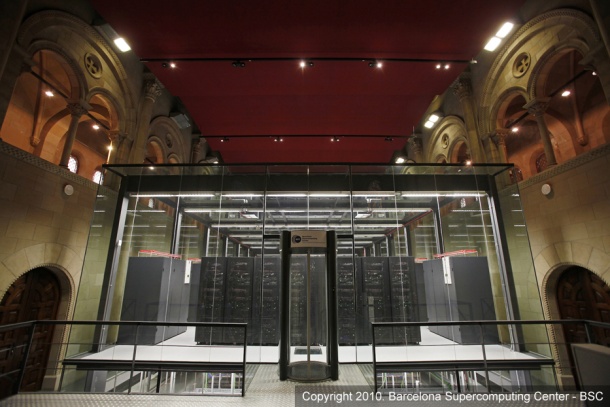EU to double supercomputing funding to €1.2bn

Supercomputing in Europe is set to get a boost after the European Commission announced plans to double its funding of high-performance computing.
Annual investment in supercomputing equipment, training and research will go from €630m (£522m) to €1.2bn to help Europe "reverse its relative decline in HPC use and capabilities", the Commission said in a statement on Wednesday.

The EU has doubled its funding for supercomputing projects to €1.2bn. Pictured: the MareNostrum computer at the Barcelona Supercomputing Center. Image credit: Barcelona Supercomputing Center
Europe's presence in the Top500 list of the world's most powerful public supercomputers has been falling for several years, while Asia's performance, spurred by heavy investment from China, has grown.
"High-performance computing [HPC] is a crucial enabler for European industry and for more jobs in Europe," Digital Agenda commissioner Neelie Kroes said in the statement. "We've got to invest smartly in this field because we cannot afford to leave it to our competitors."
The Digital Agenda funding and other measures are expected to help Europe meet its goal of becoming home to a computer capable of carrying out an exaflop of computational performance before 2020, the Commission said. An exaflop is 1,000 petaflops, which is 100 times faster than the current leading supercomputer.
At the moment, Europe has three systems that rank highly within the Top500. These are France's 1.25 petaflop Curie system, which ranks in ninth place globally, and the 1-petaflop HLRS and Hermes systems in Germany, which rank 12th and 13th respectively.
Around half of the new funds will go to the procurement of HPC systems and testbeds, one-quarter to training people and the final quarter to the development of supercomputing software by academics and private companies, according to the Commission.
PRACE
The pan-European supercomputing grid PRACE — the Partnership for Advanced Computing in Europe — will be "strengthened" as well, the Commission said, while EU member states will be encouraged to pool funds to buy leading HPC systems. The 24 countries contributing to PRACE's combined supercomputing infrastructure include the UK, as well as non-EU members such as Turkey and Norway.
"With this announcement, PRACE gets the high-level backing and the long-term funding to make a real leap forward," Ryan Heath, a spokesman for Neelie Kroes, told ZDNet UK. "We believe that the PRACE model of pooling and sharing systems and expertise makes optimal use of the limited resources available."
Due to national security concerns, European companies tend to find it difficult to sell their services to nations outside the EU, the Commission said. It plans to lobby for EU businesses to get a look-in within its ICT dialogues and trade negotiations with countries such as the US.
Though other countries house the world's top HPC builders — the US has Cray, IBM and SGI, while Japan has Fujitsu — Europe can be competitive in low-power supercomputing, systems integration and HPC applications, the Commission said.
In November, Europe tapped Nvidia to provide chips to sit alongside ARM processors for a prototype low-energy supercomputer as part of the Mont Blanc project.
Get the latest technology news and analysis, blogs and reviews delivered directly to your inbox with ZDNet UK's newsletters.